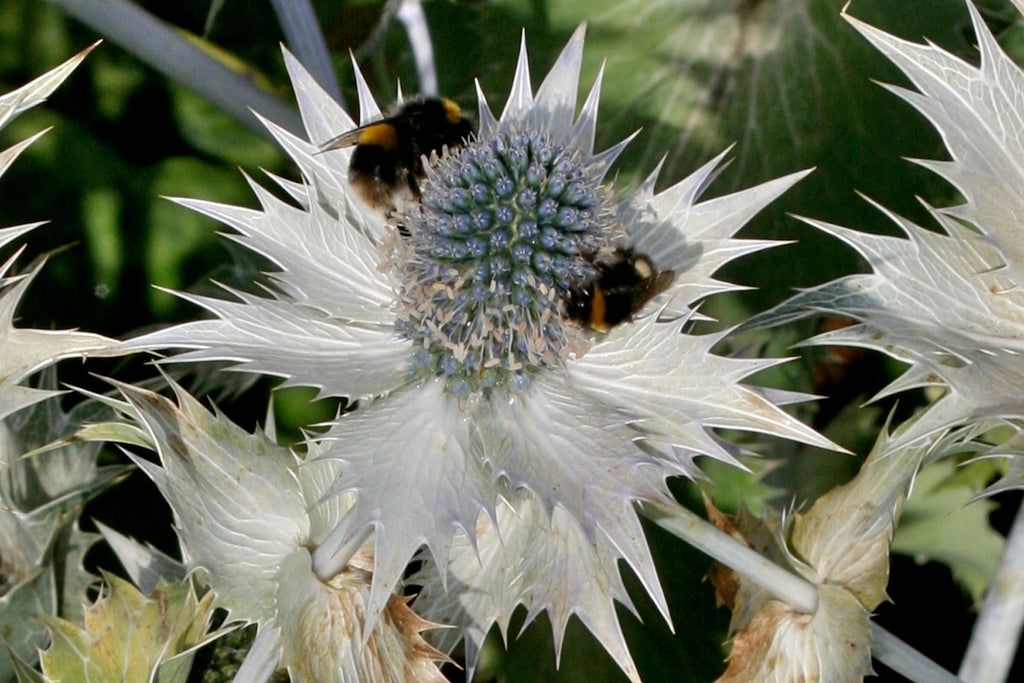
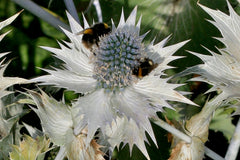
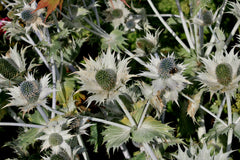
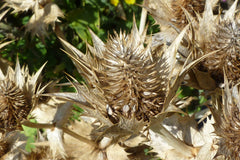
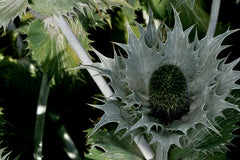
About this cultivar:
Eryngium giganteum 'Silver Ghost' is a biennial or short lived perennial cultivar that has the RHS AGM. What about it? Let's ask the RHS Eryngium Trial Committee.... 'Wonderful large steely white ruff around central flower cone; does not require staking; good as a dry flower'...they also managed to get over 100 flowers out of one plant in their 1997-1999 trial, not bad for a short lived plant!
And what about the giganteum species? Well, let's ask....me;
Eryngium giganteum, also know as Eryngium Miss Willmott's ghost, is a robust biennial or short-lived perennial forming a rosette of heart-shaped basal leaves, and spiny stem leaves, with cone-like umbels of tiny blue flowers sitting within a rosette of spiny silvery-grey bracts. Also looks great when the flowers dry out. Great for insects and for cut flowers - don't take my word for it since it has the Royal Horticultural Society Award of Garden Merit (RHS AGM).
The common name refers to Ellen Willmott, who is said to have carried seeds at all times, planting them in the gardens of fellow horticulturalists.
Ellen Ann Willmott (19 August 1858 – 27 September 1934) was an English horticulturist. She was an influential member of the Royal Horticultural Society, and a recipient of the first Victoria Medal of Honour in 1897. She sponsored expeditions to discover new species. More than 60 plants have been named after her or her home, Warley Place.
It is said she cultivated more than 100,000 species of plants - which I find hard to believe... Kew for instance reports just over 30,000, Missouri 7,500, Chicago 11,000. We reckon our garden has 5,000 cultivars - but can only guess at the species. 1000? 500? Fake news spread by the Russians I guess.
- Position: Full sun, partial shade
- Soil: Almost any soil, grows well in Ballyrobert
- Flowers: July, August, September, October
- Other features: Grows well in Ballyrobert, Bees and Butterflies, Interesting Foliage or Fruit, Cut Flowers or Dried Flowers, Royal Horticultural Society Award of Garden Merit (RHS AGM)
- Hardiness: H6 - Hardy in all of UK and northern Europe (-20 to -15°C), Fully hardy - grows well in Ballyrobert!
- Habit: Clump forming, bushy
- Foliage: Deciduous
- Height: 75 - 105 cm (2.5 - 3.5 ft)
- Spread: 45 - 75 cm (1.5 - 2.5 ft)
- Time to full growth: 2 to 5 years
- Plant type: Herbaceous Perennial (short lived), Annual or Biennial
- Colour: Green, blue, white
- Goes well with: Verbena bonariensis, Verbascum, Perovskia, Aconitum, Artemisia, Achillea, Iris, Deschampsia or even Rudbeckia.
About this genus:
Eryngium (e-ring-e-um or er-in-je-um) is a genus of flowering plants with over 250 species that, believe it or not, are in the carrot family (Apiaceae). Common names include eryngo, spiny coriander, culantro and the more popular sea holly (though the genus is not related to the true hollies, Ilex). People also often think it is a thistle (Cirsium)! Apparently you can eat the roots or use them as flavouring, although I've never tried (I guess it is in the carrot family after all.....)
Often annual and perennials with hairless and usually spiny leaves; we only grow and sell the perennial cultivars. As the common name would imply some species are native to rocky and coastal areas, but the majority are grassland plants. Despite the reputation of dry-soil-only plants we are proud of the fact we have found many cultivars that tolerate a bit of wet in our clay soil in our garden at Ballyrobert; much to the consternation of the book-believing gardeners! We sell them here. We grow them anywhere that isn't completely soaked or completely shaded although we will concede that most prefer a dry and sunny spot.
Often Eryngium are almost architectural plants and look great by themselves - when they die back for the season they keep their attractive structure. However do try them with Verbena bonariensis, Verbascum, Perovskia, Aconitum, Artemisia, Achillea, Iris, Deschampsia or even Rudbeckia. Red and blue make a good combination in my opinion. A bit like grasses; think about the light you have before planting out in order to make the most of these wonderful plants!

